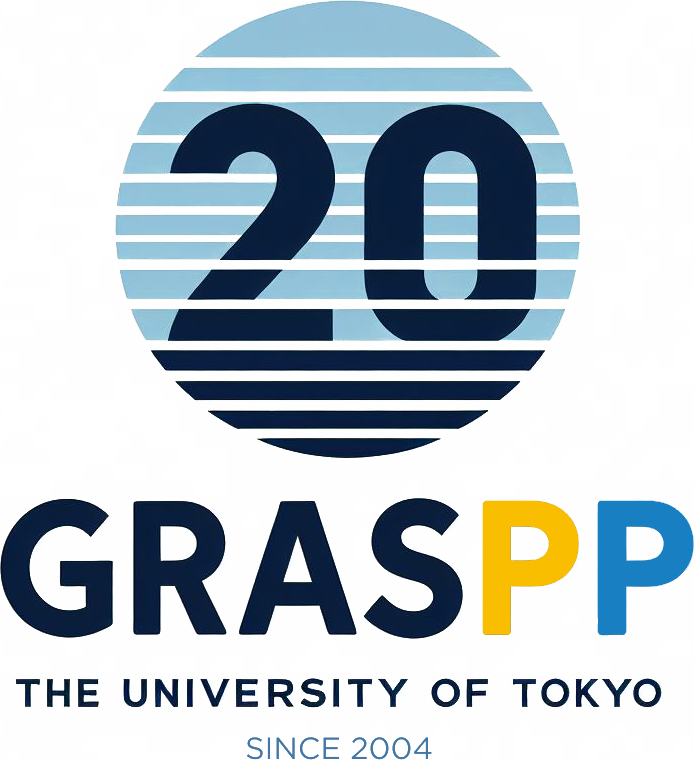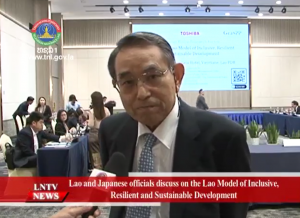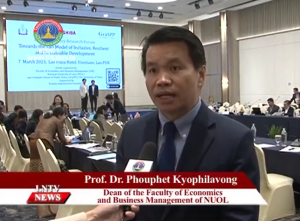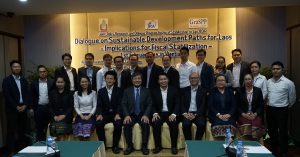Summary
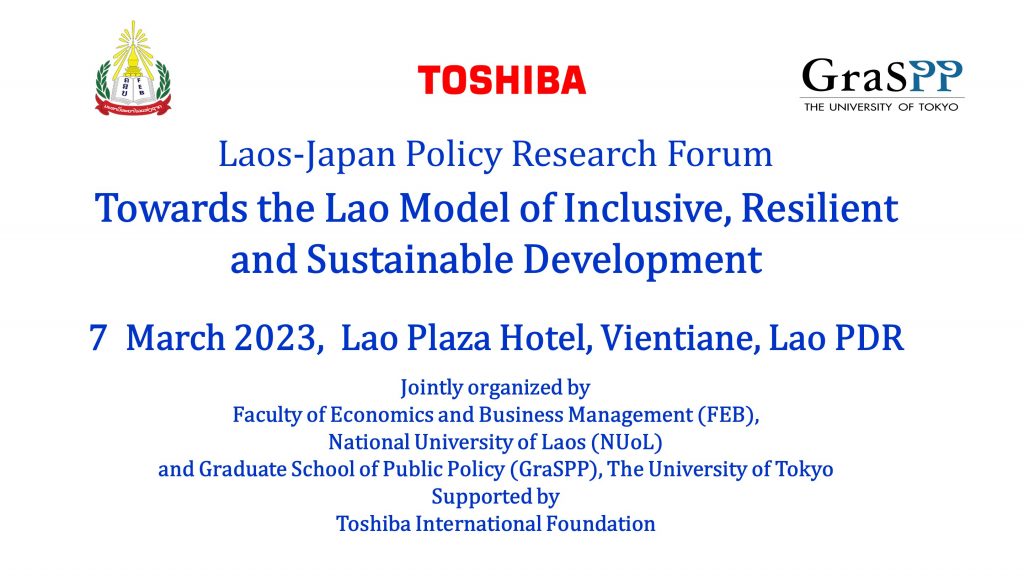
On March 7, 2023, GraSPP and the National University of Laos’s Faculty of Economics and Business Management (FEM) hosted the Laos-Japan Policy Research Forum Workshop 2023 titled “Towards the Lao Model of Inclusive, Resilient and Sustainable Development” with financial support of the Toshiba International Foundation (TIFO).
The workshop attracted more than 70 participants from the academia, government, private sector, and donor community at the Lao Plaza Hotel in Vientiane. It was honorable to have the attendance of H.E. Dr. Phouthanouphet Saysombath, Vice Minister of Finance, and H.E. Mr. Ken-ichi Kobayashi, Ambassador of Japan in Lao PDR in the plenary session.
There was extensive coverage by the local media, including interviews with key speakers from Laos and Japan.
Background
Lao PDR has managed to minimize damage to human lives amid the COVID-19 pandemic but remains in pandemic-caused economic recessions. Before the COVID-19 pandemic, despite its structural disadvantages and weaknesses, the Lao economy rapidly grew thanks to foreign direct investment in the natural resources sector. However, accelerated growth in the last decade has been accompanied by increased dependence on the natural resources sector and massive investment in infrastructure, resulting in heightened fiscal and external vulnerabilities. Concerns persist about environmental impacts and natural disaster damages. Infrastructure still needs to be developed, particularly in rural areas. The government faces challenges in attracting a wider range of foreign investors due to constraints such as a limited labor pool, a small domestic market, and ongoing problems with the business environment.
These ongoing challenges facing Lao PDR remind policymakers of the importance of enhancing the economy’s resilience to various adversities as well as the need to create their own socio-economic development model with emphasis on inclusiveness, resilience, and sustainability (“the Lao model of inclusive, resilient and sustainable development”).
Against this backdrop, the National University of Laos’s FEM and GraSPP took the lead in organizing the Laos-Japan Policy Research Forum Workshop 2023 with the TIFO’s financial support. This workshop is the sixth of the international conferences jointly hosted by the FEM and GraSPP since 2014.
Plenary session
Dean Phouphet Kyophilavong made opening remarks, and Prof. Toshiro Nishizawa made welcome remarks on behalf of the FEM and GraSPP. Both remarks referred to the long-standing partnership between the FEM and GraSPP to maintain an intellectual dialogue between Laos and Japan while expressing the most profound gratitude for the TIFO’s generous support since 2014.
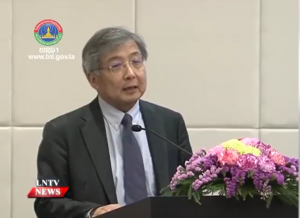
Japan’s Ambassador Kenichi Kobayashi congratulated the offline holding of the conference after a long period of restricted access to travel due to the COVID-19 pandemic and kindly paid tribute to those who made this event and our ongoing cooperation possible. He described the Government of Japan’s support at the request of the Government of Lao PDR in technical cooperation for the development of the FEM since the early 2000s. He also wished for the workshop’s success to enable discussion on the future of the Lao socio-economy and help formulate future-oriented policy responses. Ambassador Kobayashi concluded his remarks by reiterating Japan’s commitment to continuing to support the Government of Lao PDR’s efforts for the people’s benefit.
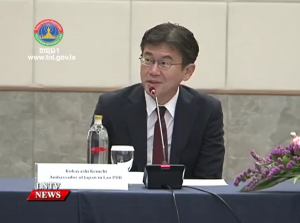
JICA’s Chief Representative Toshio Nagase described JICA’s engagement in cooperation with Laos in line with the National Socio-Economic Development Plan (NSEDP) and illustrated its three pillars of cooperation of strengthening connectivity with countries in the region, developing the industrial human resources, and rectifying disparity through balanced urban and regional development with environmental and cultural preservation. He referred to JICA’s tackling cross-sectoral issues such as macroeconomic and fiscal stabilization and enhancement of administrative capabilities, among others. Also, he highlighted its engagement in the Joint Policy Research and Dialogue Program for Fiscal Stabilization in Lao PDR from 2018-2020, a collaborative effort by researchers from Japan and Laos.
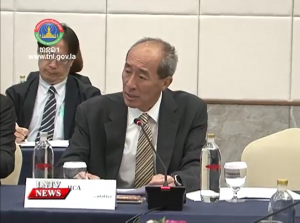
Dr. Phouthanouphet Saysombath, Vice Minister of Finance, delivered the keynote address to illustrate policy challenges facing Laos in the aftermath of the pandemic and described the government’s efforts to address such challenges to enhance the economy’s resilience and achieve inclusive and sustainable socio-economic development. He emphasized the importance of academic collaboration between Laos and Japan and expressed his expectation for input for policy formation.
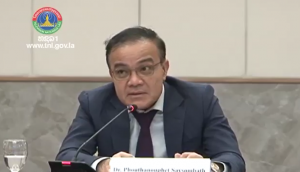
Session 1. Challenges facing Laos and a way forward
Dean Phouphet Kyophilavong initiated the session with his talk on “The Lao economy: the key challenges and some suggestions.” Dean Phouphet gave an overview of the Lao economy focusing on the impact of the COVID-19 pandemic and policy measures that have been implemented by the government, such as cash transfers, low-interest lending from SMEs Fund, various tax exemptions, and unemployment allowances, among others. He also illustrated monetary policy responses to the adversities of the pandemic. He assessed the control of COVID-19 as successful but fiscal measures as ineffective. He concluded his presentation by listing seven policy suggestions, including maintaining macroeconomic stability, avoiding debt crises, and maximizing the use of the Laos-China railway.
Prof. Toshiro Nishizawa’s talk titled “Rationale for the Lao model of inclusive, resilient, and sustainable development” focused on the development potential of Laos and the challenges to achieving the development goals. He suggested three policy recommendations. First, no one should be left behind with lost opportunities; second, resilience against various adversities matters; and third, environmental sustainability should be secured on numerous fronts for the future of humanity. Prof. Nishizawa concluded his talk by referring to his belief in the Lao model of inclusive, resilient, and sustainable development, which could be implemented successfully to bear fruit with the strong ownership of the people of Laos.
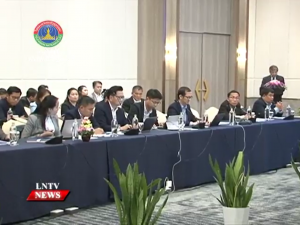
Session 2. Policy agenda
Prof. Toshihisa Toyoda of Kobe University, in his talk on “Building back better from disasters: lessons from Japanese experiences,” recalled the early stage of the FEM when his team assisted researchers and policymakers in strengthening their research and policy planning capability. He also shared his experiences building back from disasters in Japan and lessons learned from his experience with researchers and policymakers in Laos.
Prof. Ken Itakura from Nagoya City University joined online to discuss the “Impact of RCEP: a global CGE simulation” based on his recent simulation exercise. He aimed to estimate the economic effects of RCEP from 2022 onward and shared his plan to further his study.
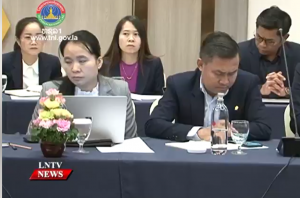
Session 3. Growth potential
Mr. Bounthone Soukavong, Lecturer, FEM, in his presentation titled “Dynamic relationship between services trade and economic growth in Lao PDR,” sought to assess the potential of the services sector’s contribution to the growth of the Lao economy based on the empirical analysis of the historical data. He concluded that services trade had a long-run positive relationship with economic growth, and therefore the government should continue liberalizing trade in services to promote employment and economic growth.
Dr. Bounlerth Vannalath, Associate Professor, FEM, in his presentation titled “The effect of the ASEAN export to the United States during the trade tension between the U.S. and China,” shared his analysis on the bilateral export performance of ASEAN countries with the U.S. market at both aggregate and disaggregate levels. He concluded that trade development between ASEAN and the U.S. was significant in terms of foreign income earning and employment generation, real GDP together with the real exchange rate depreciation had a positive effect on ASEAN’s exports in the long run, and the U.S.-China trade conflicts turned out to benefit ASEAN’s exports to the U.S. market in the long run.
Dr. Viriyasack Sisouphanthong, Associate Professor, FEM, in his presentation titled “Human resource development in Lao PDR: challenges in skills and education,” gave an overview of the state of human resource development in Laos. He identified obstacles to achieving quality employment, such as the lack of appropriate education and training and access to financial support, and emphasized the need for vocational education. Dr. Viriyasack also pointed out that language barriers, limited infrastructure and market access, and unequal inclusion of women in training and skill development were challenges.
Dr. Khaysy Srithilat, Lecturer, FEM, in his presentation titled “Monetary policy, exchange rate and inflation in Lao PDR,” asked how the monetary policy transmission mechanism worked in Laos and whether external shocks played an essential role in the functioning of the transmission mechanism among others. He concluded that the shock of the world oil price had less impact on inflation in Laos than the exchange rate depreciation and the money supply expansion, and the currency depreciation positively impacted the inflation rate. Dr. Khaysy also showed that a sharp money supply increase in response to exchange rate depreciation demonstrated Laos’s significant dollarization, and a contractionary monetary policy to increase interest rates had almost no effect on the money supply in the short and long run because most businesses relied on their own capital.
Participants asked questions and gave suggestions from academic and policy perspectives on the four presentations of young Lao researchers in Session 3. Dean Phouphet Kyophilavong and Prof. Toshiro Nishizawa gave concluding remarks by thanking the participants for their active contributions to the discussion.
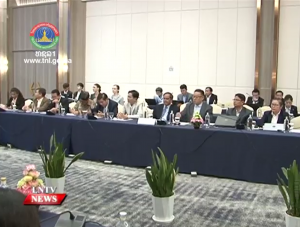
About the Forum
The Laos-Japan Policy Research Forum is a collaboration between the University of Tokyo’s Graduate School of Public Policy (GraSPP) and the National University of Laos’s Faculty of Economics and Business Management (FEM), with the support of the Toshiba International Foundation (TIFO), a public interest incorporated foundation. GraSPP co-hosted conferences with the FEM since 2014 with TIFO support in 2014, 2015, 2016, and 2023.
January 6, 2020 | “Dialogue on Fiscal Stabilization in Laos—Implication for Sustainable and Inclusive Development”
February 1, 2019 | “Dialogue on Sustainable Development Paths for Laos—Implications for Fiscal Stabilization”
November 2, 2016 | “Human and Natural Resources, and Sustainable Economic Development”
November 19, 2015 | “Enhancing Natural and Human Resources Development under ASEAN Economic Community”
October 6, 2014 | “Opportunity for Effective Natural Resources Management”
